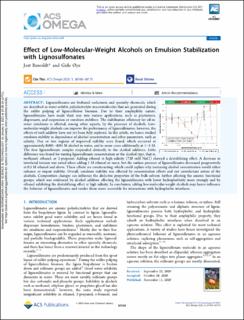| dc.contributor.author | Ruwoldt, Jost | |
| dc.contributor.author | Øye, Gisle | |
| dc.date.accessioned | 2021-01-06T08:11:33Z | |
| dc.date.available | 2021-01-06T08:11:33Z | |
| dc.date.created | 2021-01-05T11:42:28Z | |
| dc.date.issued | 2020 | |
| dc.identifier.citation | ACS Omega. 2020, 5 (46), 30168-30175. | en_US |
| dc.identifier.issn | 2470-1343 | |
| dc.identifier.uri | https://hdl.handle.net/11250/2721619 | |
| dc.description.abstract | Lignosulfonates are biobased surfactants and specialty chemicals, which are described as water-soluble polyelectrolyte macromolecules that are generated during the sulfite pulping of lignocellulose biomass. Due to their amphiphilic nature, lignosulfonates have made their way into various applications, such as plasticizers, dispersants, and suspension or emulsion stabilizer. The stabilization efficiency for oil-in-water emulsions is affected, among other aspects, by the presence of alcohols. Low-molecular-weight alcohols can improve the performance of lignosulfonates; however, the effects of such additive have not yet been fully explored. In this article, we hence studied emulsion stability in dependence of alcohol concentration and other parameters, such as salinity. One or two regions of improved stability were found, which occurred at approximately 0.001–0.01 M alcohol in water, and in some cases additionally at 1–3 M. The four lignosulfonate samples responded distinctly to the alcohol additives. Little difference was found for varying lignosulfonate concentration or the alcohol type, that is, methanol, ethanol, or 2-propanol. Adding ethanol at high salinity (720 mM NaCl) showed a destabilizing effect. A decrease in interfacial tension was noted when adding 1 M ethanol or more, but the surface pressure of lignosulfonates decreased progressively at 0.3 M ethanol and above. These effects are counteracting, which could explain why increasing alcohol concentration would either enhance or impair stability. Overall, emulsion stability was affected by concentration effects and not cosurfactant action of the alcohols. Composition changes can influence the dielectric properties of the bulk solvent, further affecting the anionic functional groups, which was evidenced by alcohol addition affecting the lignosulfonates with lower hydrophobicity more strongly and by ethanol exhibiting the destabilizing effect at high salinity. In conclusion, adding low-molecular-weight alcohols may hence influence the behavior of lignosulfonates and render them more accessible for interactions with hydrophobic interfaces. | en_US |
| dc.language.iso | eng | en_US |
| dc.publisher | American Chemical Society | en_US |
| dc.relation.uri | https://pubs.acs.org/doi/10.1021/acsomega.0c04650 | |
| dc.rights | Navngivelse 4.0 Internasjonal | * |
| dc.rights.uri | http://creativecommons.org/licenses/by/4.0/deed.no | * |
| dc.title | Effect of Low-Molecular-Weight Alcohols on Emulsion Stabilization with Lignosulfonates | en_US |
| dc.type | Peer reviewed | en_US |
| dc.type | Journal article | en_US |
| dc.description.version | publishedVersion | en_US |
| dc.source.pagenumber | 30168-30175 | en_US |
| dc.source.volume | 5 | en_US |
| dc.source.journal | ACS Omega | en_US |
| dc.source.issue | 46 | en_US |
| dc.identifier.doi | https://doi.org/10.1021/acsomega.0c04650 | |
| dc.identifier.cristin | 1865420 | |
| dc.relation.project | Norges forskningsråd: 269570 | en_US |
| dc.description.localcode | Copyright © 2020 American Chemical Society. This is an open access article published under a Creative Commons Attribution (CC-BY) License, which permits unrestricted use, distribution and reproduction in any medium, provided the author and source are cited. | en_US |
| cristin.ispublished | true | |
| cristin.fulltext | original | |
| cristin.fulltext | postprint | |
| cristin.qualitycode | 1 | |

